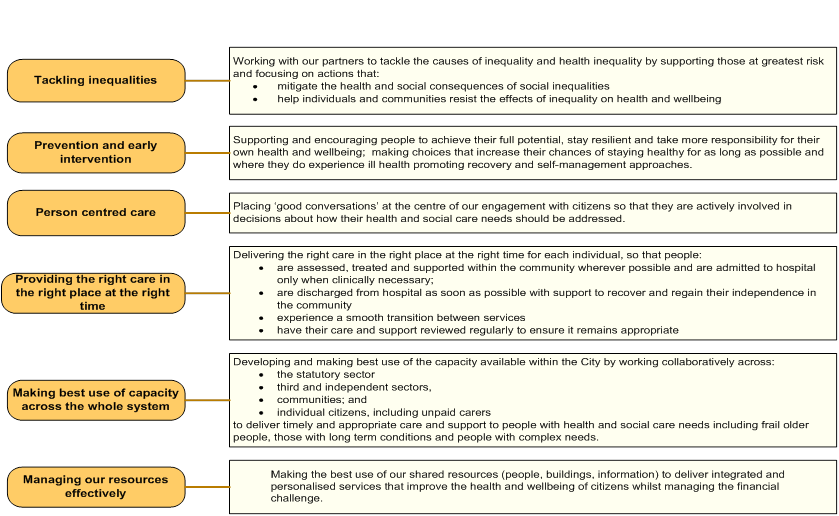The Edinburgh Health and Social Care Partnership
About Health and Social Care in Edinburgh
The new Edinburgh Health and Social Care Partnership has been created by NHS Lothian and The City of Edinburgh Council in response to the Public Bodies (Joint Working) (Scotland) Act 2014. It will be responsible for leading transformational change in the way in which the NHS and the Local Authority provide health and social care across Edinburgh/Lothian. This work will be undertaken in partnership with the third sector, local communities, independent contractors, the private sector, users, carers and staff.
Between NHS Lothian and the City of Edinburgh Council, almost 6,000 staff are employed in delivering those services and functions delegated to the Partnership. The Partnership’s total budget is in excess of £500 million.
The Partnership will develop the overarching Strategic Plan. It will be for the Partnership to determine and implement new service models and to create effective partnerships that enhances the spectrum of care delivery whilst ensuring it is provided in an integrated, seamless and sustainable way.
Increasing the pace of change is very important to the Partnership and joint working arrangements are already well established with the City of Edinburgh Council, NHS Lothian and the third sector. Demography remains a key challenge for the health and social care systems and in Scotland’s Capital City, we are committed to improving services for the citizens of Edinburgh.
The Partnership’s Integration Scheme was agreed by the Council and the NHS Board in March 2015, and the Scottish Government in June 2015. The Scheme and a full list of delegated functions is available from the following link: https://consultationhub.edinburgh.gov.uk/hsc/draft-integration-scheme-consultation
More about Health and Social Care in Edinburgh:
Integrated working: https://www.youtube.com/watch?v=Zjp6FGDyXCI
COMPASS: https://www.youtube.com/watch?v=3Rkx5hYLBLM
Stroke service: https://www.youtube.com/watch?v=xKgHlDOqQ6s
Intermediate Care: https://www.youtube.com/watch?v=XGhU_I9I7o8
Personalisation care group: https://www.youtube.com/watch?v=Gycb7KUnwVw
Self-directed Support: https://www.youtube.com/watch?v=-ErFT466CgU
Strategic Plan Consultation Link: https://consultationhub.edinburgh.gov.uk/hsc/edinburgh-health-and-social-care-partnership-draft
Health and Social Care in Edinburgh – Key Priorities
The Edinburgh Health and Social Care Partnership has agreed a number of key priorities, which will guide the planning and delivery of service for the future. The priorities fall into six broad areas:
- Tackling inequalities
- Prevention and early intervention
- Person centred care
- Providing the right care in the right place at the right time
- Making best use of capacity across the whole system
- Managing our resources effectively
The delivery of these priorities relies on us taking action as indicated in the table:

The Partnership has also agreed its visions and values as set out in the diagram:

Health and Social Care in Edinburgh – Key Facts
- The numbers of older people in the city is likely to grow. By 2032 the number of people aged over 85 is expected to double to 19,294. leading to an increase in the numbers of people needing support.
- In the area of mental health disabilities and addictions, based on population growth, conservative estimates are that of a 1.4% increase each year
- The health sector is expected to grow faster than any other sector
- There are skill shortages and unfilled vacancies
- There are an estimated 65,084 carers in Edinburgh, or 13.7% of the population
- The highest share of NHS and social care expenditure is on inpatient care which accounted for a quarter of the total in 2012 – 13.
- Three quarters of the acute inpatient care is non-elective (unplanned) admissions.
- A small proportion of the population accounts for a high proportion of costs (2.4% accounts for 50% of total health care costs and 8.4% accounts for 50% of all social care costs)
- Across the four localities there are significant differences in terms of population size, age, health, unemployment etc. there are also significant differences within localities.
- The East locality has the highest rate per 1,000 population 16+ for people being assessed or supported by Health and Social Care.
- North West has the highest number of people with one or more health conditions.
- South West has the highest percentage of residents economically inactive due to long term illness
- South Central has the highest number of people with mental health problems
- The rate of hospital beds in Edinburgh being used by someone who are ready to move on was the highest in Scotland.
Health and Social Care in Edinburgh – Partnership Structure
The Edinburgh Health and Social Care Partnership Board is made up of voting and non-voting members as follows:
Voting membership
Five councillors
Five non-executive NHS Board membersNon-voting membership
Professional advice is provided by a number of senior officials
Staff are represented by two trades union and staff partnership representatives.There are two service user and two carer members.
There is one member representing the voluntary sector.




